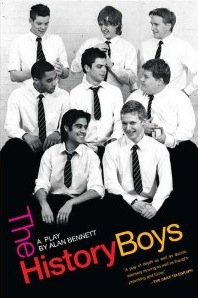
Why do we learn? Is our time in school merely a practicality, time to learn the tricks to pass the tests to get into the schools to get the jobs to be “successful”? Or does education have a duty to form us as humans and speak to deeper questions of life? In an age of standardized testing and disappearing arts budgets, these are the questions brought to the fore by our education policy; in his 2006 Tony award-winning play, The History Boys, Alan Bennett explores them through a class of nineteen eighties English schoolboys preparing for their university entrance exams and the two teachers trying to shape them along the way.
Our two perspectives are personified in Misters Hector, long-time humanities teacher, and Irwin, newly-enlisted history instructor. Hector’s classes are unstructured exploration; poetry gives way to improvised scenes in French and guess-the-classic-movie challenges. His purpose is to expose the boys as broadly as he can to works that will, he hopes, ready them for the emotional challenges of life. In a scene with one student, he speaks of encountering a spark of recognition with someone else’s work, which acts as a hand reaching out as a guide and companion through life’s rocky terrain. Irwin, meanwhile, eager and modern, sees these works as he does all information: material to be spun into clever, attention-grabbing ideas. Perhaps Holocaust isn’t unique and should be viewed simply within the context of Henry’s dissolution of the monasteries, with a bit of Wilfred Owen thrown into the essay for flavor. If it’s shallow and facile and strips the profundity from Housman and Hardy, it’s a formula for admission and advancement.
The boys are caught between the two pedagogies, unsure how to integrate them into their education. The promise of success with Irwin’s glib approach is alluring, but faced with emergent complexities on the first steps to adulthood, feel the need for Hector’s spiritual appreciation of learning. Their shifting allegiances become the barometer by which the teachers’ pull is gauged. Bennett never comes down definitively for one side, but in the touching passages given to Hector, can’t help reveal his affinity for his dying methods.
If Bennett’s cast are to a large extend symbols and allegorical stand-ins, he succeeds in a few skillful moments of wistful longing or growing self-doubt in allowing the character’s internal lives to shine through. There’s a thread about inappropriate relations with students that’s treated too blithely and ends up confusing how we’re meant to perceive some characters. But on the whole, Bennett has managed to engagingly translate a theoretical argument into approachably human terms.

No comments :
Post a Comment
Note: Only a member of this blog may post a comment.